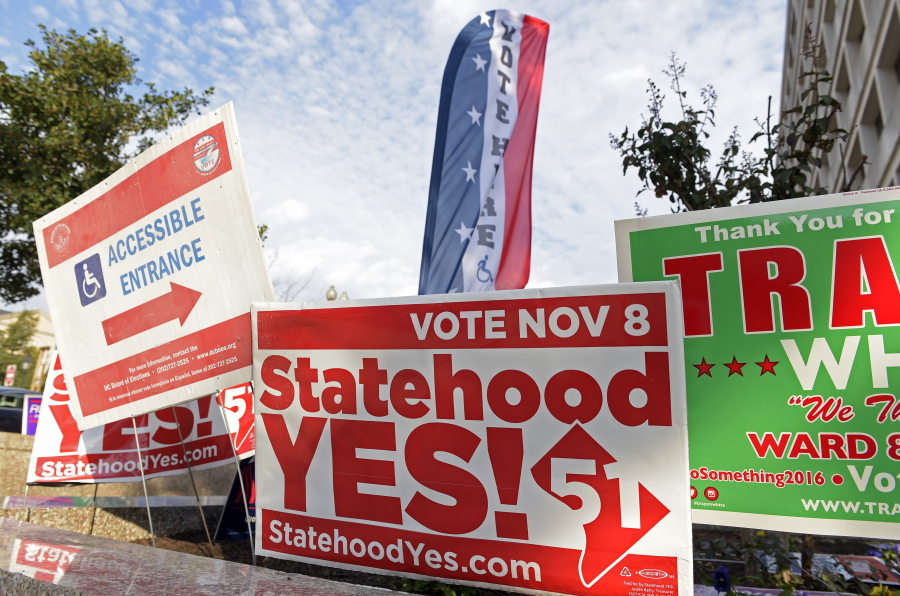WASHINGTON — In 2009, when Democrats controlled the presidency and both houses of Congress, the District of Columbia came as close as it’s ever been to gaining voting representation in Congress.
The Senate passed legislation to give the city’s delegate a vote on the House floor, but backers withdrew it after it was amended to strike down the city’s gun-control laws. The following year Republicans took control of the House, and the District’s advocates have been playing defense on Capitol Hill ever since.
Now, instead of backing incremental steps toward greater autonomy for the fast-growing city of 670,000 people, Democratic Mayor Muriel Bowser is going big with a new push for full statehood. City residents will vote next week on whether the District — more populous than Vermont or Wyoming — should present a new constitution for the proposed 51st state to Congress, and the referendum is expected to pass easily.
But even staunch statehood supporters say they’re not sure of the path forward. The referendum effort doesn’t address the partisan politics that make statehood a near-impossibility: Few, if any, congressional Republicans would ever vote to give two U.S. senators to a city where Democrats outnumber Republicans 12-to-1.
Even if Democrats take both the House and Senate, statehood has no chance.
“The Republicans would filibuster it to death,” said former GOP Rep. Tom Davis of Virginia, a moderate who supports District voting rights and led the 2009 effort.
Still, Bowser argues that the time is right for a statehood push.
“We never know what the voters will do, but they may return members of Congress that are favorable to our views, and we need to be ready,” the mayor told The Associated Press.
The moral argument for statehood is clear enough: Residents of the nation’s capital, the seat of democracy in a nation that deems its political system a model for the world, are denied full participation in that democracy. No other national capital treats its residents that way.
Under the proposed constitution, the city would elect a governor, not a mayor, and a 21-seat state legislature instead of a 13-person D.C. Council. A small chunk of land, including the White House, the Capitol and the National Mall, would be carved out as an independent federal enclave.
The nuts and bolts of statehood are more complex. Washington enjoys a special status unlike any state. The federal government subsidizes the city government and runs its judicial system. The District is also barred from taxing people who don’t live in the city on the income they earn there, and a so-called “commuter tax” is a political nonstarter for leaders in Maryland and Virginia.
Supporters of the referendum say it has advanced the conversation about statehood. Their concrete goals are less clear. Some hope a Congressional hearing would move the issue forward. But a hearing two years ago on a statehood bill led to nothing.
“I don’t consider this an end to itself,” said Wade Henderson, president of the Leadership Conference on Civil and Human Rights. “I think this is the first step along a fairly long path to reach statehood.”
At the very least, backers say, presidential candidates are now being asked about statehood. Democratic nominee Hillary Clinton says she supports it. Republican Donald Trump doesn’t, but has said giving the city a vote in the House “would be OK.”
In a city where most drivers sport license plates with the phrase “Taxation Without Representation” to call attention to the District’s unusual circumstances, a succession of mayors has struggled to harness that political goodwill into action.
Bowser hopes to change that, and she wants to fund a national lobbying and education campaign around statehood. She declined to say how much she’d spend. D.C. Council member David Grosso, a left-leaning independent, said advocates need to spend $100 million or more to get results.
Some statehood advocates are open to more practical solutions.
Joe Sternlieb, a co-founder of the nonprofit DC Vote, which lobbies for District voting rights, has proposed turning the capital into a Hong Kong-like, autonomous city-state that joins with a state, likely Maryland, for the purposes of congressional representation. The main drawback: That’s more likely to be supported by Republicans than by Democrats, who control city politics. Bowser said she doesn’t support it.
“The Republicans would let us merge with another state. It’s the Democrats who feel that independence is more important than equality,” Sternlieb said. “If Republicans are unwilling to make us independent, I think it’s a deal that we should explore.”



